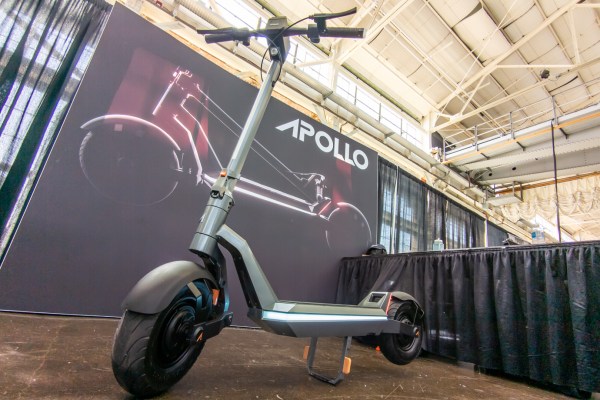The folks at Apollo aren’t messing around when they say they aren’t cutting any corners in creating their new Apollo Pro scooter. The new electric scooter has all the bells and whistles. The $3,600 Pro will stand at the peak of the company’s current lineup of scooters, ranging from the $700 Apollo Mini through the $3,000 Apollo Phantom.
The original Apollo Pro was an OEM, so we were just buying it from a factory and putting our logo on it,” shrugs Eloi Pecquet, Apollo’s CTO, in an interview with TechCrunch at the Micro Mobility America conference today. “We stopped selling the previous ‘Pro’ in 2021 and the new one is coming out in 2023. This one is going be the real ‘pro,’ in performance, finish and quality, not just a ‘pro’ as a marketing name.”
The new scooter looks fantastic and packs a hell of a punch. The two-wheeler has two-wheel drive for maximum speed and traction. The scooter has a top speed of 60 mph (!), and can accelerate to 19 miles per hour in three seconds or so.
One clever touch is that it uses your smartphone as its display. The scooter has built-in wireless charging, so when you clip your phone into the handy handlebar mount, it serves as a GPS and to show you the scooter controls, speed and battery status, while giving its own battery a top-up.
Apollo developed its “M1” controller that drives the motors and ingests data from 10 different sensors. The company claims it collects 22 data point per second, and uses that data to create a whole new level of riding experience. The sensors include GPS for location data, and a veritable shipping container worth of features: fall detection, theft deterrence, collision warnings and much more. Of course, being a smart device, the riding experience is fully customizable via the app, including the top speed, acceleration rate and how its lights and horn function.
“We really put all the craziest features in it. It has IoT functionally, a Bluetooth speaker and LEDs all around the scooter. The most expensive part is the cast aluminum base,” said Pecquet. “Right now, the approach for electric scooters is to use a lot of small components that are attached together. This creates a lot of room for mistakes: tolerances need to be tight between all those points. That is impossible! There is a reason why Apple makes the MacBook Pro out of a single piece of aluminum: No mistakes.”
Apollo is taking its inspiration from high-end product design, which is immediately obvious when you see it in real life. It has a ton of clever design touches and extraordinary attention to detail. For example, to keep all this power on the road and to ensure the scooter is as safe as it can be, it uses tires that are 12 inches tall and 3.5 inches wide. It uses a self-healing gel lining to keep the air where you want it.
[gallery ids="2399610,2399607,2399608,2399611,2399609"]
“The vibe we were going for was a combination of the Tesla Cybertruck, the MacBook Pro and the iPhone all combined together,” explains Pecquet. “I think it’s the most beautiful scooter on earth. I’m pretty proud of that. I think I’ve made something special and the Pro only marks the beginning of three scooters we are making. We are introducing a new design language with it. And I really think that after we release the Pro, we won’t need to put our logo and our name everywhere on this scooter. Just by seeing the design language of the scooter, we’re going to be known for this. And so that’s what I’m the most excited about. It’s our identity coming to reality.”
The three scooters Apollo’s CTO is referring to are the three upcoming models. The Pro is up first, followed soon after by the Explore and the Light.
The Apollo Pro features two braking mechanisms: a regenerative brake as well as two low-maintenance drum brakes for extra braking power and safety during an emergency stop. The main braking mechanism is the regenerative system, which can restore the battery’s life by up to 10% while riding.
“I believe that people can feel the attention to detail. When you open the Pro, you have a powerful M1 controller which is way too expensive. It has a beautiful blue case with a heat sink. All the wires, the battery case and all the connectors inside, too, are all top-tier,” Pecquet gushes with excitement. “We really want people to have the feeling that we are transcending the category. We are in the game to really, really make a difference.”
The Apollo Pro will cost around $3,600, and the company suggests it’ll be ready to ship in Q2 2023. If you want to place a preorder, you can do that today for $20. The company is also planning a financing option starting at $99 per month.
For starters, it will build 500 units that it will be selling at cost to people in its own community, in an effort to get early feedback.
“At this price point, we don’t have room for error,” Pecquet concludes, referring to the feedback program.
